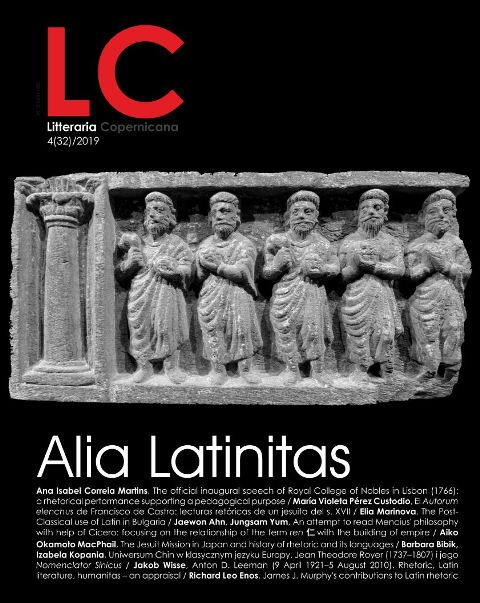The Post-Classical Use of Latin in Bulgaria
DOI:
https://doi.org/10.12775/LC.2019.047Słowa kluczowe
Greek and Latin in the East Balkans, Latin in medieval Bulgaria, Latin works of the Bulgarian CatholicsAbstrakt
The article summarizes the evidence about the use of Latin in Bulgariaduring the Middle Ages and the early modern period and comments the reasons for the lack of knowledge or the indifference to the literary tradition of the Latin West till the end of the nineteenth century. Beginning with the transformation of the Roman world in the Late Antiquity, the post-classical fate of Latinitas in the Bulgarian lands tells us for the most part a story about cut threads, periods of forced isolation from the Latin West (the spread of humanism and the access to the great achievements of the following cultural epochs in Europe were blocked by the Turkish invasion in 1396), and reconsidered confessional and political choices. My intention, however, is to present the few separate channels of transmitting Latin language and literary culture to the educated élite in Bulgaria, i.e. the diplomatic contacts with the Papacy and the European rulers, the direct or indirect translations from Latin sources, and the original works written in Latin by the Bulgarian Catholics in the seventeenth century. In these times, and later, indirect translations dominated, it was only in 1873 that the first major direct translation of a Latin text into Bulgarian appeared.
Bibliografia
Biller, Peter [&] Anne Hudson (eds.) 1994. Heresy and Literacy, 1000–1530. Cambridge University Press.
Cholov, Peter 1988. Chiprovskoto vastanie 1688. [The Chiprovtsi Uprising 1688]. Sofija: Narodna prosveta.
Dimitrov, Bozhidar 2001. Petǎr Bogdan Bakšev – bǎlgarski politik i istorik ot XVII vek. [Petǎr Bogdan Bakšev – A Bulgarian Politician and Historian of the 17th century]. Sofija: Nauka i izkustvo.
Dimitrov, Emil 1999. Dǎrzhava i tsǎrkva prez XIII vek. Prepiska na bǎlgarite s papa Inokentij III. [State and Church in the XIIIth century. The Correspondence of the Bulgarians with Pope Innocent III]. Sofija: Slavica.
Dondaine, Antoine 1950. „Le Tractatus de hereticis d’Anselme d’Alexandrie”. In: La hiérarchie cathare d’Italie, II. AFP (Archivum Fratrum Praedicatorum), 20. 307–324.
Dragova, Nadezhda 2005. Starobǎlgarskata kultura. [The Old Bulgarian Culture]. Sofija: LIK.
Dujčev, Ivan, Primov, Borislav, Vojnov, Michail (eds.) 1960. Fontes Latini Historiae Bulgaricae. T. II. Sofia: BAN.
Dujčev, Ivan, Primov, Borislav, Vojnov, Michail (eds.) 1965. Fontes Latini historiae Bulgaricae, T. III. Sofia: BAN.
Fermendžin, Eusebius (ed.) 1887. Acta Bulgariae ecclesiastica ab a. 1565 usque ad a.1799. (Monumenta spectantia historiam Slavorum meridionalium XVIII). Zagrabiae: Academia sciantiarum et artium Slavorum meridionalium.
Gjuzelev, Vassil, Strashimir Lišev et al. (eds.) 1981. Fontes Latini historiae Bulgaricae, T. IV. Sofia: BAN.
Gjuzelev, Vassil 2009. Papstvoto i bălgarite prez Srednovekovieto. [The Papacy and the Bulgarians During the Middle Ages]. Plovdiv: Bălgarsko istorichesko nasledstvo.
IJsewijn, Jozef 1990. Companion to Neo-Latin Studies. Part I. History and Diffusion of Neo-Latin Literature (Supplementa Humanistica Lovaniensia V). Leuven/ Louvain: Leuven University Press and Peeters Press.
Nikolova, Anna (ed.) 2002. Klassicheska literatura. (Prevodna receptsija na evropejskite literaturi, T. 3). [Classical literature. (Translations of the European Literatures, Vol. 3)]. Sofia: Marin Drinov.
Primov, Borislav (ed.) 1993. Dokumenti za katolicheskata dejnost v Balgaria prez XVII vek. [Records of the Catholic Activity in Bulgaria during the XVII c.]. Sofia: St. Kliment Ohridski University Press.
Spasitelna kniga. Gratskijat original na Simeonovija sbornik 2008. [The Soul-Saving Book. The Greek Original of Simeon’s Miscellany 2008]. Translated by Petya Yaneva and Serguey Ivanov. Sofia: Archetype.
Pobrania
Opublikowane
Jak cytować
Numer
Dział
Statystyki
Liczba wyświetleń i pobrań: 776
Liczba cytowań: 0



